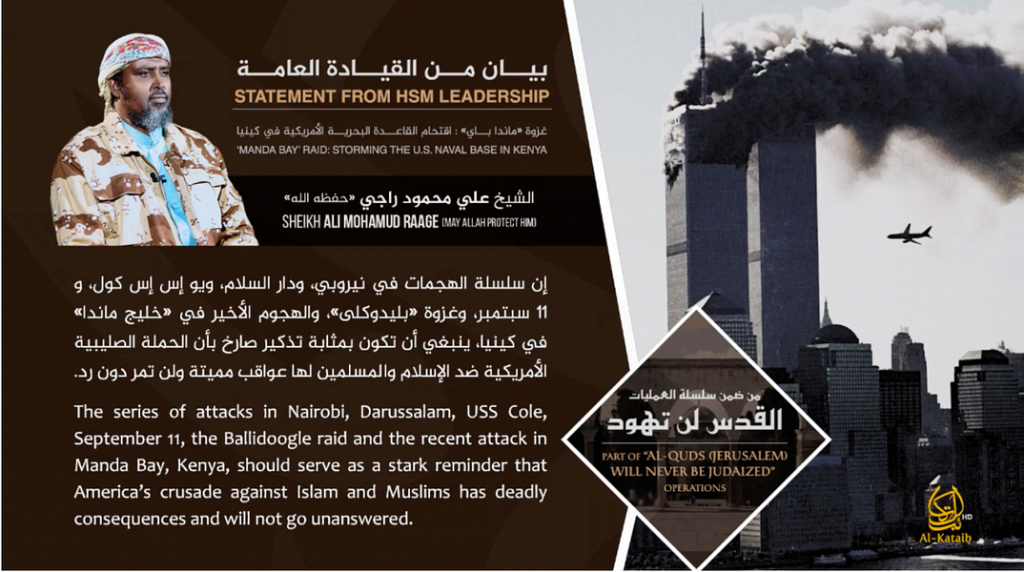On December 16, the Department of Justice announced that Cholo Abdi Abdullah, a 30-year-old Kenyan national, had been charged with plotting a 9/11-style attack inside the U.S. Abdullah was a member of Shabaab, al-Qaeda’s branch in East Africa, and he began pursuing the hijacking plot in late 2016. Between 2017 and 2019, Abdullah attended a flight school in the Philippines. He was finally detected, arrested in July 2019 and eventually transferred to U.S. custody earlier this month. The court filings reveal that Abdullah wasn’t the only Shabaab operative selected to take part in the hijacking operation. Authorities have identified at least one other prospective pilot, an unnamed individual who was likely detained in Africa.
While Americans have many other concerns these days, ranging from the coronavirus pandemic to the so-called great power competition with China, the terrorist threat hasn’t gone away. Al-Qaeda operatives with an intent to strike in the West are still out there lurking, hoping to slip through America’s defenses. Fortunately, they’ve failed time and again to pull off another spectacular, mass casualty attack inside the U.S. But that doesn’t mean they will stop trying.
Shabaab is often described as one of al-Qaeda’s affiliates. Al-Qaeda itself refers to Shabaab as one of its regional branches. Shabaab is waging jihad to topple the U.S.-backed government in Mogadishu and replace it with a totalitarian regime based on its radical version of sharia, or Islamic law.
A small contingent of about 700 American troops has been working with the Somali government and regional partners to prevent that from happening. But earlier this month, President Trump ordered that they be withdrawn from the country. The conflict in Somalia is considered one of the “endless wars,” which President Trump and President-elect Biden have vowed to end. So, U.S. military forces are being repositioned to neighboring countries.
U.S. Africa Command, which oversees the military’s efforts in East Africa, vows to fight on, launching airstrikes and other raids from outside of Somalia. “To be clear, the U.S. is not withdrawing or disengaging from East Africa,” Gen. Stephen Townsend said in a statement on Dec. 19. “We remain committed to helping our African partners build a more secure future.”
Still, U.S. military officials quietly concede that their mission will be more difficult now that they’ll have even fewer boots on the ground to track down Shabaab’s men. But how many Americans understand what that mission is in the first place? My guess is not many—and that’s a problem.
The U.S. has been conducting military operations in Somalia under the 2001 Authorization for the Use of Military Force. That law was passed in the wake of the 9/11 hijackings and gave the U.S. military a broad license to hunt down al-Qaeda and associated forces. There is no real material dispute over Shabaab’s status. In the past, some analysts tried to play disconnect the dots, pretending that Shabaab was something other than really a part of al-Qaeda. That torturous analytic effort eventually failed, mainly because Shabaab insists on broadcasting its fealty to al-Qaeda.
Shabaab is part of al-Qaeda, or for those still denying that reality, indisputably an “associated force” of al-Qaeda under the 2001 AUMF. The group privately swore allegiance to Osama bin Laden in 2010. Bin Laden’s successor, Ayman al-Zawahiri, publicly accepted Shabaab’s oath in February 2012. The group remains openly loyal to al-Qaeda to this day. Shabaab’s current emir, Abu Ubaydah Ahmed Umar, has clearly stated his own allegiance to Zawahiri. Al-Qaeda’s senior leadership has maintained a hand in the group’s activities through years. Moreover, Shabaab’s propaganda arm regularly celebrates the 9/11 hijackings and other high-profile attacks while emphasizing that it is part of al-Qaeda’s global media network.
However, lawmakers could not possibly have envisioned that U.S. forces would still be involved in Somalia (let alone Afghanistan) nearly two decades after they passed the AUMF. That’s part of the reason the “endless wars” narrative has become so prevalent. For good reasons, Americans don’t like open-ended warfare with undefined outcomes. The jihadists are principally insurgents, not conventional military forces, meaning they are organized to fight on indefinitely. And today, at the end of 2020, there is no political consensus inside the U.S. regarding the use of force in Africa or elsewhere to contain and disrupt them.
It may be the case that if Congress were to vote on the matter today, then elected representatives would decide that they no longer want to authorize military activities inside Somalia. So be it. If that were the case, at least there would be a political resolution to the “endless wars.”
But that still wouldn’t change the facts about Shabaab. It is a part of al-Qaeda. Its men control significant turf inside Somalia today, and they are capable of capturing more in the near future. The jihadists threaten civilians in the countries surrounding Somalia. And, as evidenced by the plot involving Cholo Abdi Abdullah, a part of the group has an eye on attacks inside the U.S.
As I’ve written previously, Trump and Biden can claim they want to “end” the “endless wars” all they want. That doesn’t mean the terrorists will stop fighting.






Please note that we at The Dispatch hold ourselves, our work, and our commenters to a higher standard than other places on the internet. We welcome comments that foster genuine debate or discussion—including comments critical of us or our work—but responses that include ad hominem attacks on fellow Dispatch members or are intended to stoke fear and anger may be moderated.
You are currently using a limited time guest pass and do not have access to commenting. Consider subscribing to join the conversation.
With your membership, you only have the ability to comment on The Morning Dispatch articles. Consider upgrading to join the conversation everywhere.